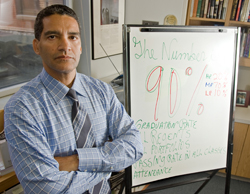Hold That Line!
It may not have been what he expected when he first applied to the program, but one thing Hector Geager learned during his 15 months as a Teachers College Cahn Fellow was that he has a lot in common with a Union Army Civil War General named Joshua Chamberlain.
“The Union Army was losing and the Confederates were on the verge of breaking Chamberlain’s line—and if they did, the entire Union defense was going to fall apart. But Chamberlain kept his men fighting, and when they ran out of ammunition they charged. At that point, the Confederates turned and ran.
The lesson? “For me, it was that when you’re in a position of leadership, sometimes you have to be fearless. You have to hold the line. Because if you’re not, then later on you won’t be able to make difficult decisions in order to advance the organization.”
Geager has had ample opportunity to put that lesson in practice. During the Program, he heard visiting faculty member Richard Elmore talk about the importance of promoting distributed leadership and developing internal accountability systems, and ultimately Geager decided to make those aims his action research challenge.
“At my school, the teachers in each grade form teams and select team leaders from among themselves. They self-manage. One of my big concerns was how to make these teams more accountable without using that word, because it’s a word that scares them. They hear it and they think, ‘If I don’t perform, it will be documented, I’ll be fired. And if my students don’t perform, it will reflect on me.’”
Geager’s approach was to ask the grade teams to list their 10 priorities for improving student performance, and then choose the top three for long-term measurement. The request was, in itself, something of a reality check that forced teachers to focus on the art of the possible. For example, his ninth grade teacher team initially proposed “increasing students’ self-awareness” as one of their priorities.
“I told them it was a great goal, but that it’s really not something teachers are equipped to measure—it’s more appropriate for psychologists or social workers—and they agreed,” Geager says.
Instead, the teachers focused on more concrete deliverables like getting students to complete their autobiography profiles and pass the Living Environment Regents exam. But then Geager posed an additional challenge: What was the recovery plan going to be? That is, what would the teachers do when, inevitably, some students didn’t meet those goals?
“They came up with a plan to meet with those students one-on-one in our after-school program and provide them with additional support,” Geager says.
Not everyone responded well to Geager’s initiative. A few teachers left, and there were others who were initially resistant. But a core group bought in and the rest eventually followed their lead.
Today, Manhattan Village Academy is the city’s top-ranked “regular” school (that is, among non-specialized small schools) in terms of preventing students from becoming over-aged and under-credited. It was also recognized by New York State in 2005–06 as being among the top schools that have contributed to closing the achievement gap.
“I’m grateful to the Cahn Fellows Program, because I was inspired to feel that making these kinds of changes is worth doing. It gave me the courage to hold the line and not fear the reactions of some of the teachers,” Geager says. “And today, I think they’re glad, too. Because while before, we were a good school, now I think we’re an exceptional one.”
Published Friday, Jun. 15, 2007
